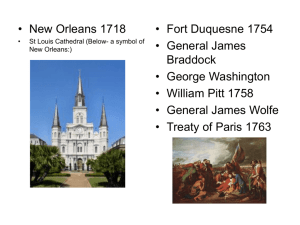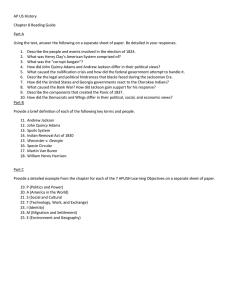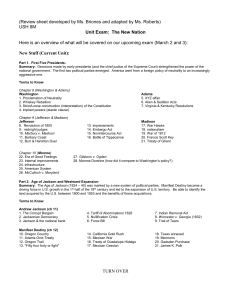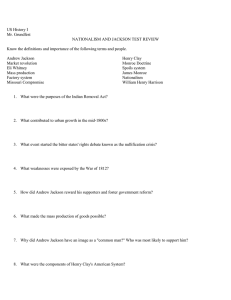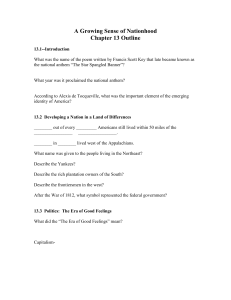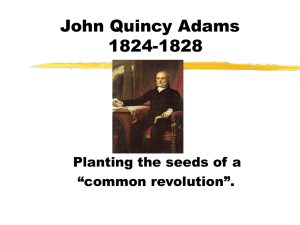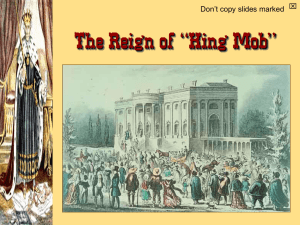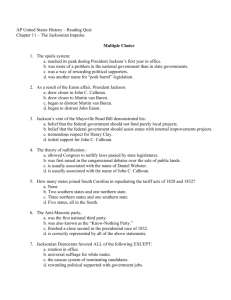• New Orleans 1718 • Fort Duquesne 1754 • General James Braddock
advertisement
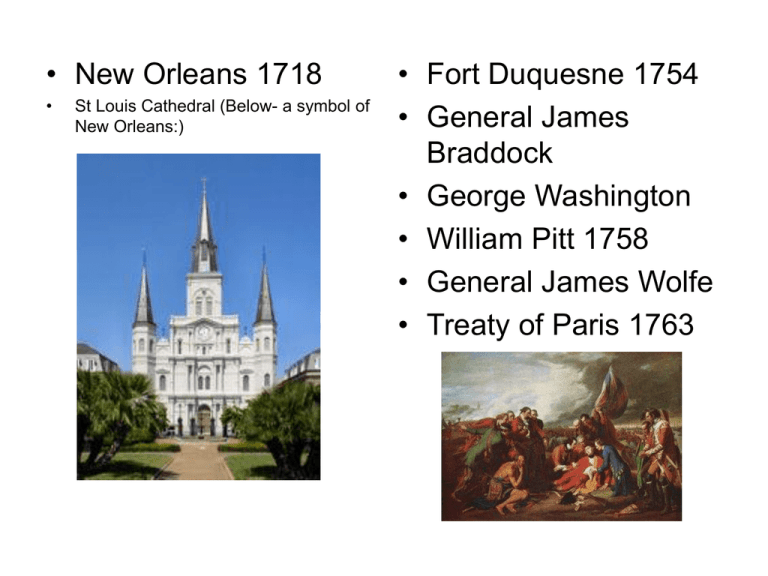
• New Orleans 1718 • St Louis Cathedral (Below- a symbol of New Orleans:) • Fort Duquesne 1754 • General James Braddock • George Washington • William Pitt 1758 • General James Wolfe • Treaty of Paris 1763 Background to Revolution • “Pennsylvania ‘Dutch’” • “Scotch-Irish” (ScotsIrish) • French Huguenots • “The Enlightenment” • John Locke • Deism • Freemasonry • “The Great Awakening” • George III 1760 • George Grenville 1763-1765 • Revenue Act of 1764 (Sugar Act) • “Salutary Neglect” • Stamp Act 1765 • Townshend Acts 1767 • Sam Adams • Committees of Correspondence • Lord North • “Boston Massacre” • Tea Act of 1773 • Boston “Tea Party” • “Intolerable Acts” • First Continental Congress Sept. 1774 • Continental Association • Committees of Safety • General Thomas Gage Revolution • Battle of Bunker Hill (Breed’s Hill) June 1775 • Loyalists (Tories) • John Locke • Sam Adams • John Adams • Thomas Paine, Common Sense January, 1776 • Declaration of Independence July 4, 1776 • Thomas Jefferson • Benjamin Franklin • The Articles of Confederation 1777 • Sir William Howe • General John Burgoyne (“Gentleman Johnny”) • Horatio Gates • Benedict Arnold • Battle of Saratoga 1777 • Lord Cornwallis • Nathanael Greene • Treaty of Paris 1783 Constitution • • • • Thomas Paine Congregationalists Anglican Church Jefferson’s Statute for Religious Freedom • “Not Worth a Continental” • Specie Currency • Daniel Shays • Shay’s Rebellion 1786-1787 • Robert Morris • Beard, An Economic Interpretation of the Constitution • Impost of 1781 • Northwest Ordinance 1787 • James Madison • Alexander Hamilton • “Virginia Plan” • “New Jersey Plan” • Constitutional Convention 1787 • Federal System • Electoral College • Federalists • Anti-Federalists Early Politics • George Washington • The French Revolution 1789 • Jay’s Treaty 1795 • Federalists • Republicans • The Alien and Sedition Acts • John Adams • Kentucky & Virginia Resolutions • “The Revolution of 1800” • Aaron Burr Age of Jefferson • Thomas Jefferson 1800-1808 • John Marshall • Marbury vs. Madison 1803 • Louisiana Purchase 1803 • Lewis & Clark Expedition 1804-1806 • Nonimportation Act 1805 • Embargo Act of 1807 • Nonintercourse Act 1809 • Macon’s Bill No. 2 1810 • “War Hawks” (Henry Clay, John C. Calhoun) • Clay (top): Calhoun (below): • James Madison 1808- • Treaty of Ghent 1815 1816 • James Monroe 1816• War of 1812 1824 • Andrew Jackson • Monroe Doctrine 1823 • John Quincy Adams Economic Development • William Henry Harrison • Creeks • Cherokees • Andrew Jackson • John C. Calhoun • Harrison Land Act of 1800 • Eli Whitney • “King Cotton” • Cotton Gin • Turnpike • De Witt Clinton • Erie Canal • James Monroe 18161824 • “Era of Good Feelings” • John Quincy Adams • William H. Crawford • Henry Clay • “American System” • 2nd National Bank • Nicholas Biddle • Tariff of 1816 • Dartmouth College vs. Woodward 1819 • McCulloch vs. Maryland 1819 • Gibbons vs. Ogden 1824 • Missouri Compromise 1820: Age of Jackson • • • • • • Election of 1824: Popular Vote: Electoral Vote: Jackson 151,000 99 J Q Adams 113,000 84 Crawford 40,000 41 Clay 47,000 37 • Caucus • Andrew Jackson 1828-1834 • “Bargain and Corruption” • Democratic Republican Party • National Republican Party • “American System” • “Spoils System” • Martin Van Buren • Doctrine of Nullification 1832 • Force Bill 1833 • Specie Circular 1863 • Peggy Eaton Affair Expansion (“Manifest Destiny”) • • • • • • Martin Van Buren Panic of 1837 Independent Treasury Bill Whig Party 1833 William Henry Harrison1840-1841 • • • • • John Tyler 1841-1844 John Calhoun Henry Clay Lewis Cass James K. Polk 18441848 • Liberty Party • James G. Birney • “Spot Resolutions” • General Zachery Taylor • Battle of Buena Vista 1847 • General Winfield Scott • Colonel Stephen Kearney • John C. Fremont • Nicolas P. Trist • Treaty of Guadalupe Hidalgo 1848 • Gadsden Purchase 1853 • • • • • Wilmot Proviso 1846 Freesoil Party Compromise of 1850 Millard Fillmore Stephen A. Douglas • Franklin Pierce Frontier & Society • Alexis de Tocqueville, Democracy in America 1835 • Frederick Jackson Turner (“The Frontier Theory”) • American Party (Order of the Star Spangled Banner, “Know Nothings”) • Romanticism • Transcendentalism: Ralph Waldo Emerson (top), Henry David Thoreau (bottom). • James Fennimore Cooper • Deism • Unitarian Church • Great Revival • Utopianism • Abolitionism Frederick Douglass (below) • • • • • • Mormonism Charles Fourier Horace Greeley Dorthea Dix Horace Man Temperance Frances Willard WCTU (below) The South • Abolitionism • American Colonization Society • Tappan Brothers • William Lloyd Garrison • The Liberator • American Anti-Slavery Society • Nat Turner Rebellion 1831 • Frederick Douglass • Sojourner Truth • The Underground Railroad • Harriet Tubman • Cassius Clay Origins of the Civil War • Compromise of 1850 • National Trades Union 1834 • Harriet Beecher Stowe, Uncle Tom’s Cabin 1852 • Hinton Rowan Helper, The Impending Crisis of the South 1857 • Stephen A. Douglas • Kansas-Nebraska Act 1854 • “Popular Sovereignty” • Republican Party • “Bleeding Kansas” • “Border Ruffians” • “Jayhawks” • John Brown • American Party (“Know Nothings”) • Franklin Pierce • James Buchannan • Millard Fillmore • John C. Fremont • Dred Scott Case 1857 Presidential Election of 1860: • • • • Abraham Lincoln- Republican Stephen A. Douglas- Northern Democrat John C. Breckinridge- Southern Democrat John Bell- Constitutional Union Party Lincoln wins- South secedes from the union Jefferson Davis becomes the President of the Confederate States The Civil War • • • • Fort Sumter The Confederacy Robert E. Lee “Stonewall” Jackson Lee (left), Jackson: • William T. Sherman • Ulysses S. Grant Grant (left), Sherman • George B. McClellan • Gettysburg July1, 1863 • Jefferson Davis • “Peace Democrats” • Radical Republicans: Charles Sumner, Thaddeus Stevens • • • • • Morrill Tariff Act Homestead Act 1862 Morrill Land Grant Act John C. Freemont Second Confiscation Act • Emancipation Proclamation January 1, 1863 • Andrew Johnson • Wade-Davis Bill 1864 • Freedman’s Bureau • John Wilkes Booth
